
5 Best B2B Data Providers in Switzerland in 2025
Switzerland is recognized as one of Europe’s most stable and advanced B2B environments. Its strategic location in the heart of the continent, robust legal and financial systems, multilingual workforce, and diverse economy contribute to this reputation. With over 600,000 active enterprises across industries like finance, pharmaceuticals, precision manufacturing, professional services, and IT—Switzerland provides a rich foundation for B2B sales, partnerships, and digital growth.
As both Swiss and international businesses increasingly prioritize automation, personalization, and real-time market insights, access to reliable and up-to-date B2B data is becoming essential. Whether targeting fintech innovators in Zurich, biotech clusters in Basel, industrial firms in St. Gallen, or global headquarters in Geneva, high-quality business data is crucial for successful outreach, CRM optimization, and account-based marketing.
In this article, we will highlight the leading B2B data providers operating in Switzerland in 2025. We will evaluate their data coverage, volumes, datasets offered, and information on compliance with European privacy regulations, including GDPR and the Swiss Federal Act on Data Protection ( FADP). Whether you are planning to expand across the DACH region, enter new verticals, or refine your go-to-market strategy, these providers will help you unlock the full potential of Switzerland’s dynamic and data-driven business ecosystem.
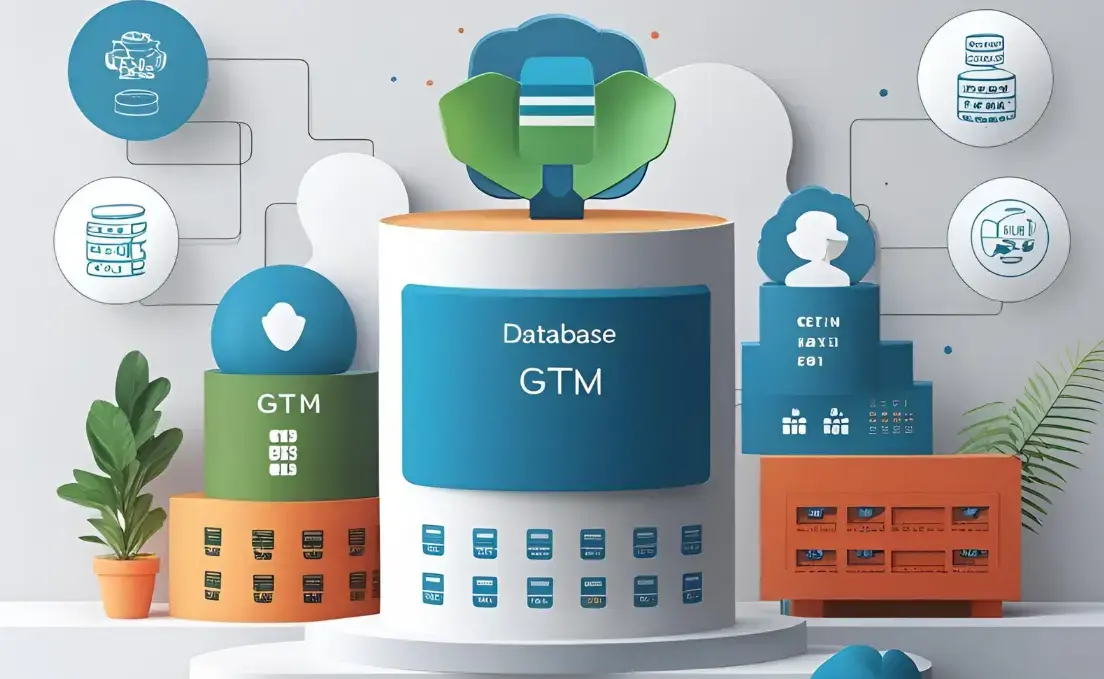
What is GTM (Go-to-Market) Data?
What is GTM (Go-to-Market) Data?
GTM data refers to all the information and business insights used to fuel every aspect of a company’s go-to-market strategy - which, simply put, always leads to generating leads and boosting sales. You could think of GTM data as a roadmap that reveals who's active on the market (meaning real, operating businesses), and then helps us figure out which of those companies to target, who to reach, how to reach them, and when is the best moment to engage.
It starts right from the basics: learning about specific companies that are active today - things like their industry, size, location, and more. From there, GTM data supports decisions around who to target, how to group customers into meaningful segments, how to craft the right messaging, what channels to use, and how to optimize performance.
Since the topic is so broad, GTM data - and the platforms built around it aren’t just one-time tools. They’re living, evolving systems that drive strategy, planning, and execution. Based on go to market data, better decisions are made and ideal customers can be found and reached. So, GTM data isn’t just raw info- it’s the intelligence behind targeting, channel strategy, sales outreach, product positioning, performance metrics, and much more.
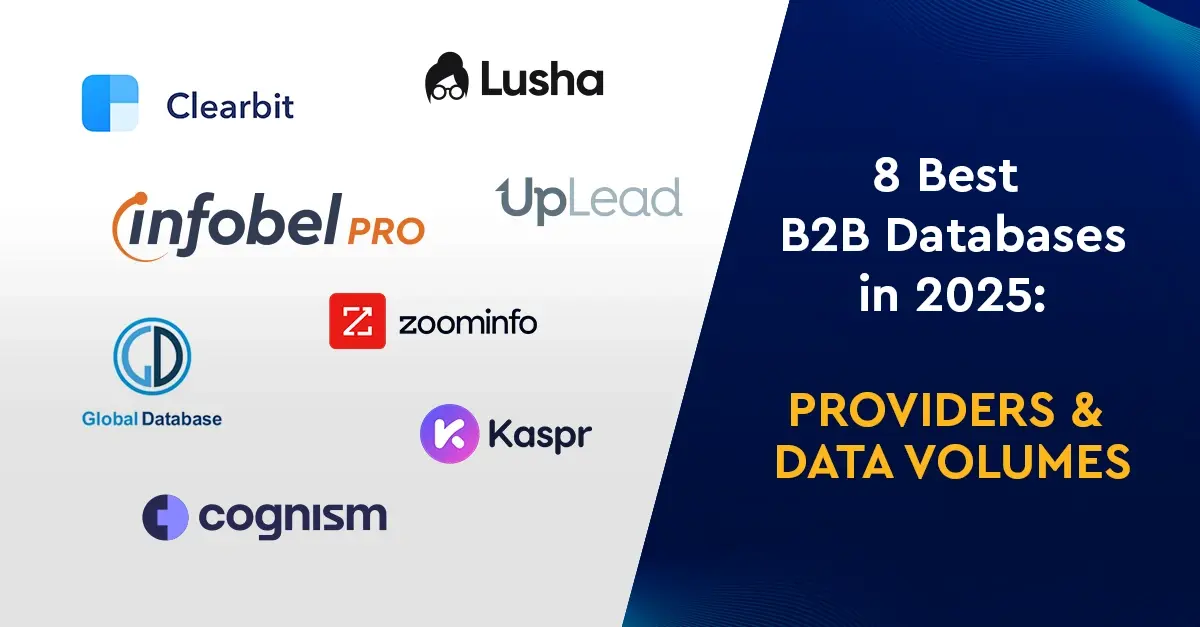
8 Best B2B Databases: Providers & Data Volumes in 2025
The term "B2B database" is becoming increasingly recognized and is gaining traction across various industries. Nowadays, any business looking to expand its presence, enter new markets, or build partnerships will likely require a B2B database. Access to accurate and up-to-date company information is no longer just a competitive advantage; it has become a necessity. The number of use cases for B2B databases is vast and ever-growing.
B2B databases are primarily utilized to identify new business opportunities, target companies, obtain contact details, enhance Customer Relationship Management (CRM) systems and Go-To-Market (GTM) tools, uncover relationships between companies and individuals (often to prevent fraud), and even develop mapping and navigation platforms. There are countless ways companies use this data - and even as a B2B database provider, we still keep discovering new ones.
What is a B2B database and what information does a good database contain?
A B2B database is a structured collection of information about businesses. It typically exists as a file or digital system containing thousands of company profiles, each described with numerous attributes. This database serves as a central source for crucial details such as company size, industry, revenue, and contact information - all essential data for prospecting, segmentation, CRM enrichment, and go-to-market strategies.
While firmographic data (such as industry, size, and revenue) is fundamental, advanced B2B databases also include:
1) Technographic data: Information about tools, platforms, and software used by the company
2) Contact data: Contact details of decision-makers, including their emails, phone numbers and social media URLs
3) Corporate linkages: Relationships between parent companies and subsidiaries
4) Historical records: Information on the company's evolution and past performance
This comprehensive data provides businesses with a complete 360° view of their market and clients.
Demand for B2B databases is rising. In recent years, the demand for high-quality B2B databases has surged. This growth is driven by the rise of account-based marketing (ABM), sales automation, AI-led segmentation, and real-time decision-making needs.
According to Google Trends, global interest in terms like B2B data and data enrichment has more than doubled since 2020 - signaling how integral business data has become to growth strategies.
In this article, we gathered and compared the 8 best B2B databases available globally in 2025, examining their data volumes, features, providers, and ideal use cases.
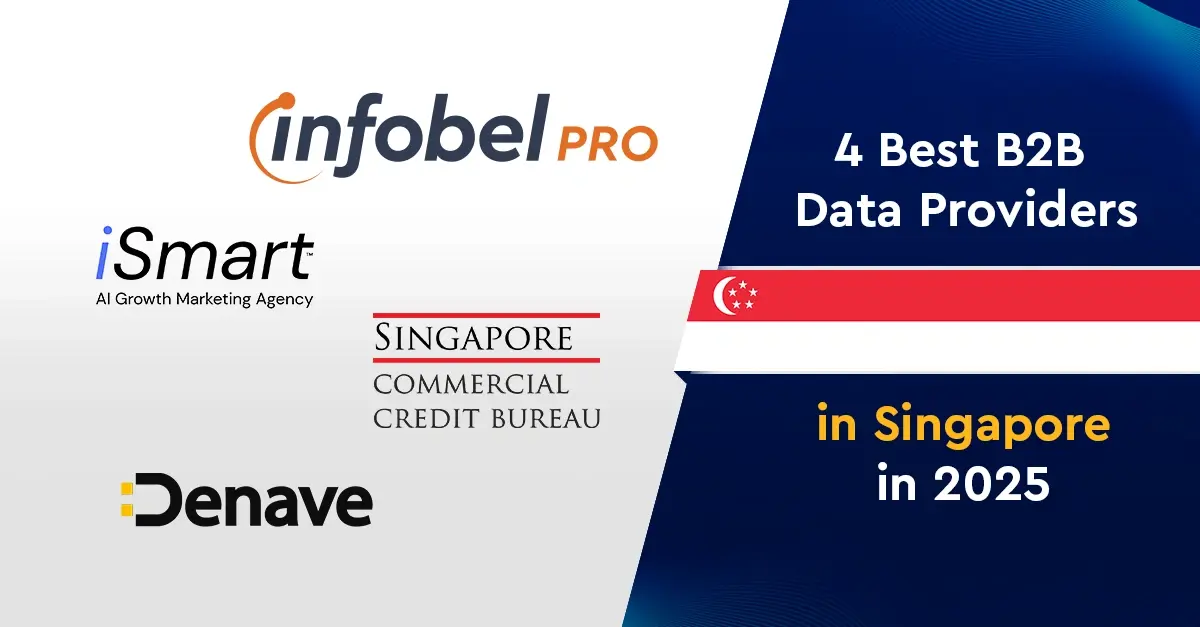
4 Best B2B Data Providers in Singapore in 2025
Singapore stands out as one of Asia's most advanced B2B hubs thanks to its strategic location, world-class digital infrastructure, pro-business regulatory environment, and diverse economy. With over 500,000 active businesses across various sectors, including finance, technology, logistics, manufacturing, professional services, and biotech, Singapore offers a fertile ground for B2B sales, marketing, and data-driven innovation.
As businesses increasingly rely on automation, personalization, and real-time insights, access to accurate and compliant B2B database has become essential. Whether targeting startups in One-North, tech giants in Marina Bay, or industrial players in Jurong, leveraging reliable business data is crucial for developing effective go-to-market strategies. High-quality data not only supports account-based marketing (ABM) and sales prospecting but also enhances CRM segmentation and improves marketing ROI.
In this article, we profile the top business data providers in Singapore for 2025, evaluating their coverage, capabilities, and compliance with global and regional privacy standards, including GDPR and Singapore's Personal Data Protection Act (PDPA). Whether you're scaling locally or expanding into the APAC region, these providers can help unlock the full potential of Singapore's dynamic B2B marketplace.
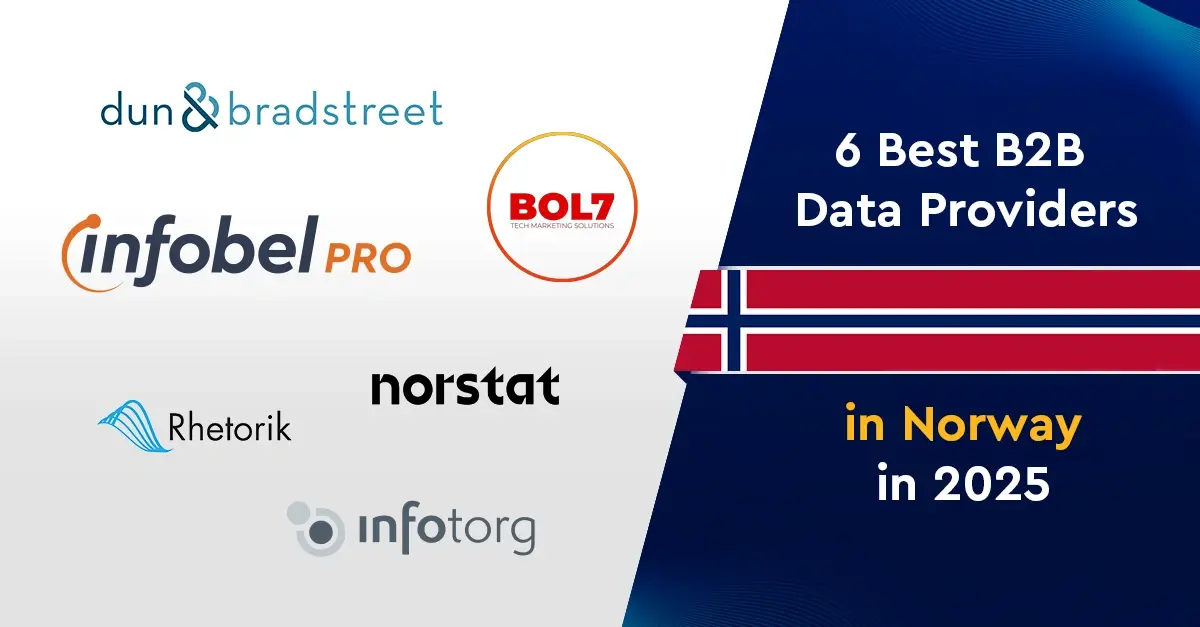
6 Best B2B Data Providers in Norway in 2025
Norway's business landscape is rapidly evolving, with a strong emphasis on digital transformation and data-driven decision-making. As companies strive to improve their operations and expand new markets (including Norwegian market), the demand for reliable B2B data providers has increased significantly. This article explores the leading B2B data providers in Norway for 2025, providing insights into their services, their data coverage and the broader market context.
Norway is steadily emerging as a sophisticated hub for B2B activities in the Nordic region, thanks to its robust digital infrastructure, vibrant entrepreneurial landscape, and a stable, high-income economy. With nearly 2 million companies, including over 600,000 registered across sectors such as technology, energy, manufacturing, logistics, professional services, and maritime industries, the Norwegian market presents abundant opportunities for sales, marketing, and data-driven innovation.
As organizations increasingly embrace automation, personalization, and real-time decision-making, the demand for accurate and comprehensive business data has become more critical than ever. Whether targeting local SMEs or multinational enterprises based in Oslo, Bergen, or Stavanger, reliable B2B data providers are essential for developing effective go-to-market strategies and driving business growth. Access to a structured, dependable, and fully GDPR-compliant database is not merely optional - it represents a strategic advantage. High-quality business data enables organizations to enhance prospecting, fuel account-based marketing (ABM) campaigns, optimize CRM systems, and improve marketing ROI.
In this article, we will highlight all the leading B2B data providers in Norway, evaluating each based on data volume, coverage, and compliance with European data privacy regulations. Whether you are expanding into the Nordic region or scaling your operations locally, these providers can help you unlock the full potential of the Norwegian B2B market.
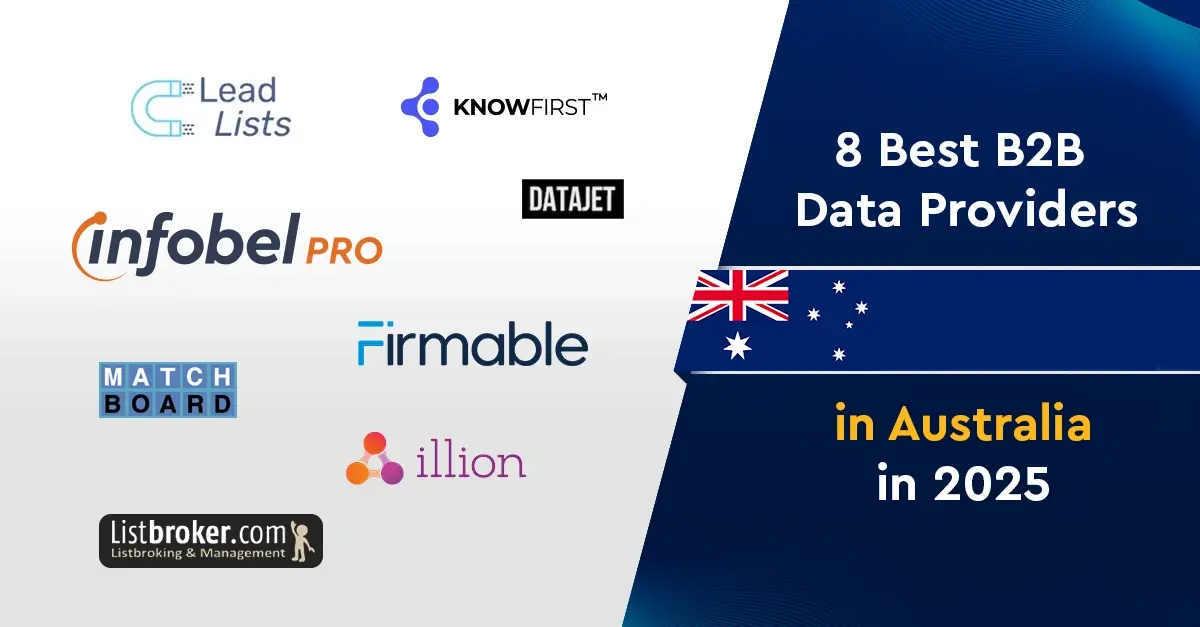
8 Best B2B Data Providers in Australia in 2025
Australia continues to thrive as a dynamic hub for the B2B ecosystem, offering a wealth of opportunities for marketers, sales teams, and data-driven businesses. With millions of active businesses — including SMEs and large enterprises — the Australian market is both diverse and digitally mature, spanning key industries like finance, technology, healthcare, education, mining, retail, and logistics.
As digital transformation accelerates, so does the demand for accurate, high-quality business data. This makes dependable B2B data providers essential for growth-focused companies aiming to scale efficiently in an increasingly competitive landscape.
Unlike B2C, success in B2B marketing hinges on reaching the right decision-makers, building trust, and delivering personalized, value-driven content. That’s why access to a clean, well-structured, and fully GDPR-compliant database isn’t just a nice-to-have — it’s a core ingredient for lead generation and long-term success. With the right data, businesses can optimize targeting, boost campaign performance, and significantly increase marketing ROI.
In this article, we explore some of the best B2B data providers in Australia — evaluating each based on data volume, coverage, standout features, and compliance with global privacy regulations.

Understanding GDPR: What It Means for Companies Working with B2B Data
GDPR Confuses (and Concerns) Businesses
GDPR is often the subject of intense discussions, legal audits, compliance checks, and even business-wide operational changes. For many companies — both big and small — it’s a source of confusion, fear, or uncertainty. What exactly does it cover? How strict is it? And how does it impact your day-to-day work with data?
Whether you're a sales team using contact data, a marketing department running outreach campaigns, or a data provider sourcing business records — GDPR applies. And non-compliance doesn’t just mean a slap on the wrist. The consequences can be severe, as shown by some of the biggest tech giants.
In this article, we break down GDPR in simple terms, focusing on what it means for companies working with B2B data. From understanding what’s regulated to learning from real-world fines, we’ll help you navigate compliance with clarity and confidence.
What is GDPR?
The General Data Protection Regulation (GDPR) is a comprehensive data protection law enacted by the European Union (EU) in 2018. It was designed to protect the privacy and personal data of EU citizens and residents. GDPR regulates how companies collect, store, process, and share personal data, ensuring that individuals have control over their own information.
Why is GDPR Important for Companies Working with Data?
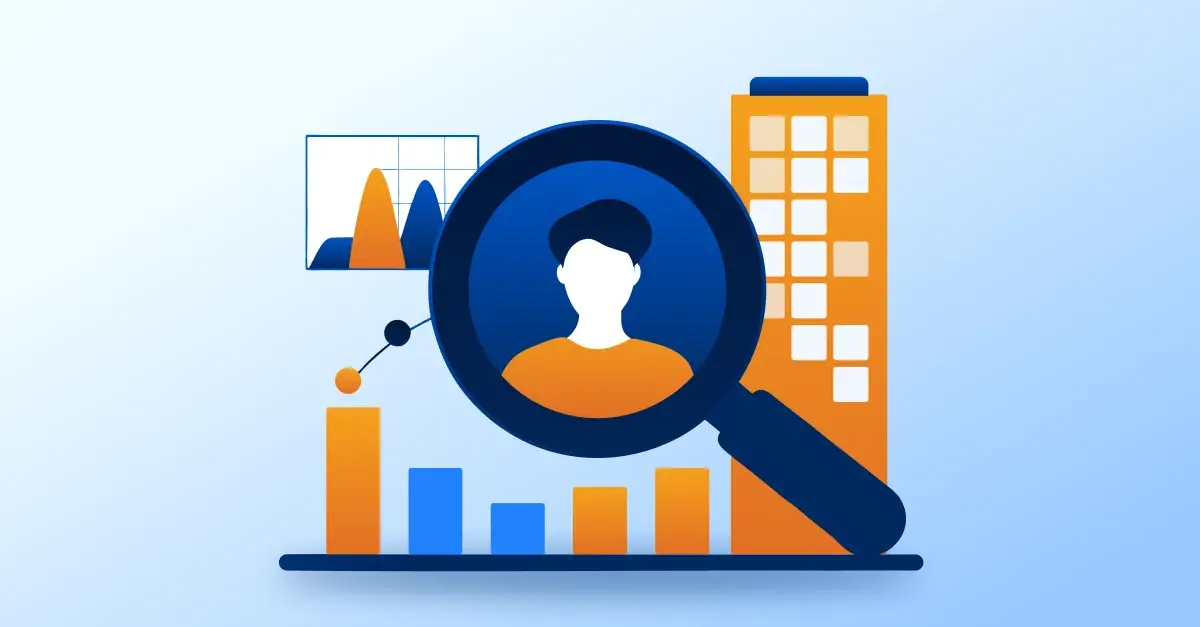
What is ABM? Account Based Marketing Guide 2025
What is Account-Based Marketing?
Account-based marketing (ABM) is a lead generation strategy that focuses on identifying ideal customer profiles (ICPs), also called accounts, and targeting them. These "accounts" are simply companies and their key decision-makers. Such marketing strategy enables targeting accounts based on various attributes, such as company size, industry, revenue, location, size, corporate linkage, and much more.
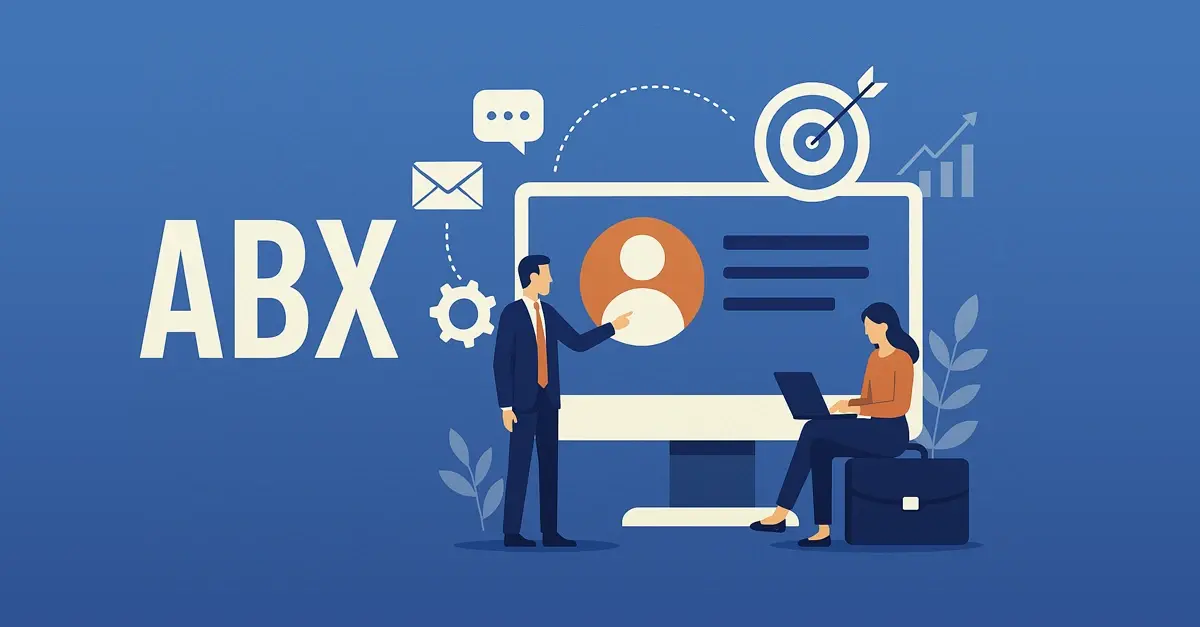
Account-Based Experience (ABX) Meaning, Examples and Data
In the constantly changing world of B2B marketing, traditional strategies such as Account-Based Marketing (ABM) are evolving into more advanced methods. One such approach is Account-Based Experience (ABX), which is a comprehensive strategy that not only targets high-value accounts but also emphasizes providing personalized experiences throughout the entire buyer journey. In this article, we will explore the meaning and examples of ABX, discuss its significance, and guide you on how to start implementing an effective ABX strategy.

Geospatial Data Examples: Featuring 3 Real-World European Headquarters
In this article, we aim to simplify key geospatial data terms and illustrate an example of a geospatial dataset using data from the headquarters of three well-known European companies.
At its core, geospatial data refers to any information tied to a specific location on Earth’s surface—such as businesses, parks, buildings, roads, rivers, or even natural features like mountains.
Depending on the type, geospatial data goes far beyond basic coordinates (latitude and longitude) or addresses. Geospatial datasets can include attributes like building footprints and geometry, building types and surface areas, and business-related details such as opening hours, industry classification, contact information, website URLs, ratings, and more. The scope is broad, and these datasets are always built to suit specific needs and use cases—from navigation and urban planning to environmental monitoring and resource management.
There are several types of geospatial data, including vector data, time-based data, POI data, and more. In this article, we focus on a dataset showcasing POIs (Points of Interest) and their basic attributes. To provide real-world examples, we feature the headquarters of three well-known European companies: Louis Vuitton, Volkswagen, and TotalEnergies.
These examples highlight how geospatial data is structured within a dataset and is made ready for immediate use in mapping, navigation, or spatial analysis tools. The table below presents these three examples, along with key geospatial attributes such as addresses, precise coordinates, building geometry, surface area, building types, and more.
